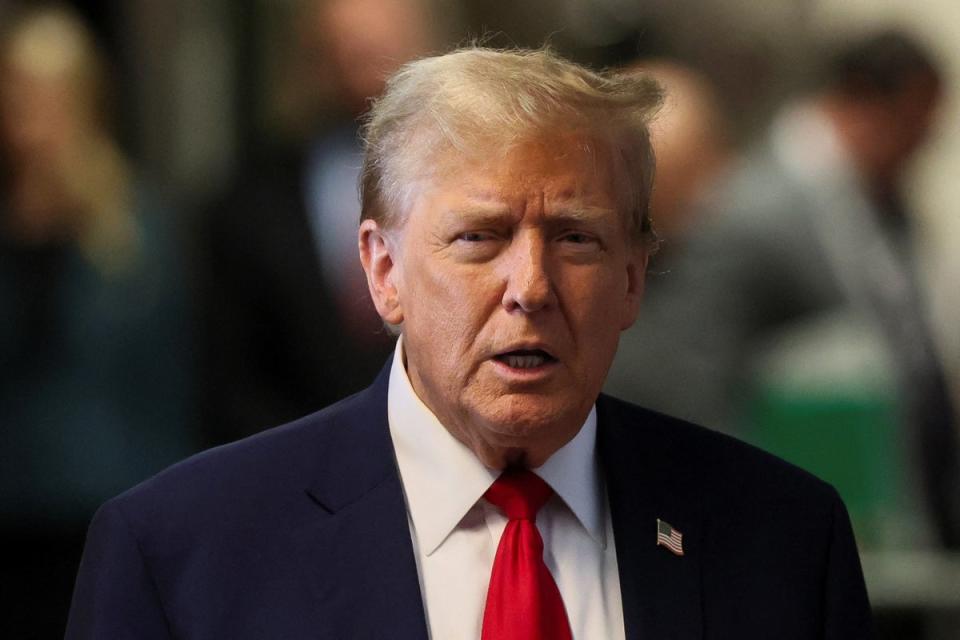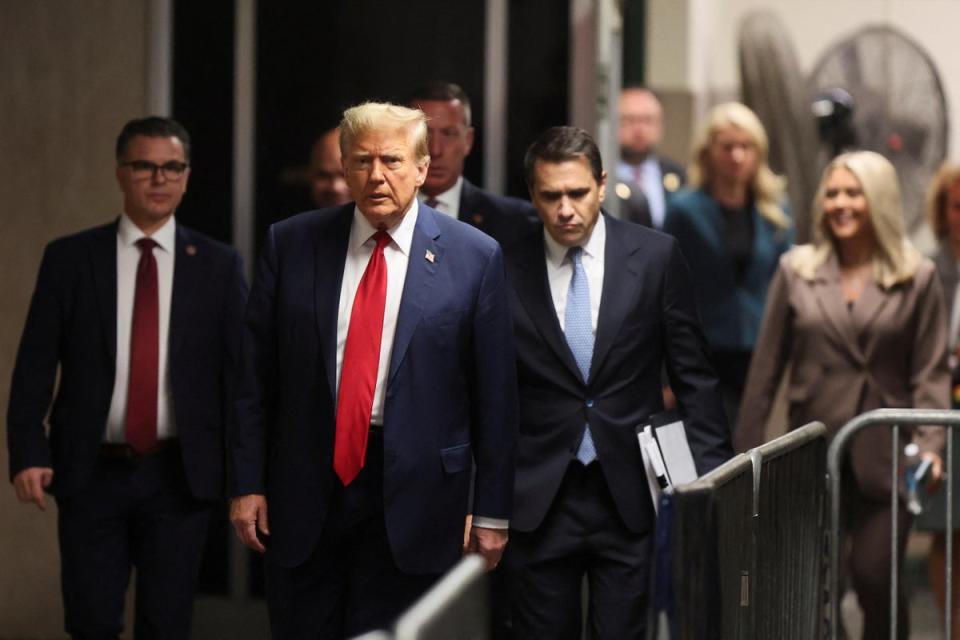The judge overseeing Donald Trump’s criminal hush-money trial in New York appeared unconvinced by his lawyer’s defense against allegations that the former president repeatedly and deliberately violated a silence order that prevented him from attacking witnesses in the landmark case .
Prosecutors in Manhattan have accused Mr. Trump of violating the silence order through at least 10 different posts on his Truth Social platform and campaign website, including posts targeting Michael Cohen and Stormy Daniels — likely witnesses in the trial.
Attorney Todd Blanche has argued that Trump’s posts were responding to “political” attacks, but did not provide examples of what exactly Trump was responding to.
“You have presented nothing,” New York Judge Juan Merchan said Tuesday at the end of an hour-long hearing, as he grew increasingly frustrated with Mr. Blanche’s defense.
“You’re losing all credibility, I’ll tell you that now,” he added.
Lawyers from the office of Manhattan District Attorney Alvin Bragg have argued that Mr. Trump violated a nearly month-old silence order in the case at least a dozen times. On the second day of the trial, as jury selection was underway, the judge also directly warned Trump about intimidating jurors in his courtroom.
Judge Merchan first implemented a gag order in March, banning Trump from making public statements about witnesses, jurors and others involved in the case. A week later, the order was expanded to include public statements about the families of the judge and DA Bragg.
Prosecutors now want the judge to hold Mr Trump in contempt, fine him $10,000 and order him to remove the offending posts. They are “not yet” asking for prison time, prosecutors said.
Judge Merchan will rule at another time.

On his Truth Social platform, Trump targeted his former lawyer and “fixer” Cohen on April 15, posting a column by The New York Post who labeled him a “serious perjurer” who “will try to prove an old crime against Trump in order to embarrass the New York justice system.”
Trump’s campaign website also posted the headline and linked to the column.
The former president and his campaign reshared the message the next day.
Mr. Trump’s Truth Social account also posted a column with a photo of Mr. Cohen with the caption: “No, Cohen’s guilty plea does not prove Trump campaigned against financial crimes.”
On April 17, after seven jurors were sworn in to hear the case, his Truth Social posted an unsubstantiated statement attributed to Fox News personality Jesse Watters. “They catch undercover liberal activists lying to the judge to get on the Trump jury,” it said.
The next morning, Juror No. 2 returned to court to tell the judge that aspects of her identity released to the media had prompted some of her friends, colleagues and family members to ask her about the case.
“I do not believe at this time that I can be fair and unbiased and not let outside influences influence my thinking in the courtroom,” she told the judge.
She was excused from the case.
Moments later, Manhattan prosecutors alerted the judge to Trump’s “disturbing” Truth Social post quoting Watters. “It’s ridiculous, and it has to stop,” Assistant District Attorney Christopher Conroy told the judge.
During Tuesday’s hearing, Conroy said Trump has a habit of saying “whatever he wants to say to get the results he wants.”
Here he “knowingly and intentionally violates the crystal clear, unambiguous lines established by the court” in the protective order, he said.
The court’s silence orders are “an unequivocal mandate” to restrict Trump’s statements about known witnesses and jurors, prosecutors wrote in a filing last week.
Trump’s “very public statements” should be viewed “as attempts to intimidate witnesses into remaining silent,” Assistant U.S. Attorney Joshua Steinglass said last week. “This effort continues to this day.”


Mr. Trump is charged with 34 counts of falsifying company records as part of an alleged hush-money scheme to silence adult film star Ms. Daniels to prevent her from going public before the 2016 election about an alleged affair she had in 2006 with Mr. Trump had.
Prosecutors allege the case involves election interference and a broader scheme to block the publication of potentially compromising stories about Mr. Trump and his business in the run-up to the 2016 presidential election.
The silence order in his criminal trial follows silence orders in his civil fraud case and in his federal election interference case, in which prosecutors warned that his social media pulpit could be used to fuel attacks.
Special Counsel Jack Smith’s team, which is overseeing Mr. Trump’s federal criminal cases, described this dynamic in court documents as “part of a years-long pattern in which people publicly targeted” by Mr. Trump “are subject to intimidation, threats and intimidation”.
The former president “is seeking to use this well-known dynamic to his advantage,” the filing added, and “this case has continued unabated as this case and other unrelated cases involving the defendant have progressed.”
Silence orders in the New York fraud case prevent Trump, his lawyers and all other parties in the case from being discredited by court staff.
A state appeals court left the orders in place after the lawsuits revealed a wave of credible death threats and abusive messages that followed Trump’s attacks on court staff and others.
An official with the New York court system’s Department of Public Safety wrote in an affidavit last year that “the implementation of the limited silence orders” in the fraud case “resulted in a decrease in the number of threats, intimidation and disparaging messages sent to the judge and received his staff.”
The threats against New York Judge Arthur Engoron and his law clerk Allison Greenfield were “serious and credible and not hypothetical or speculative,” he wrote.